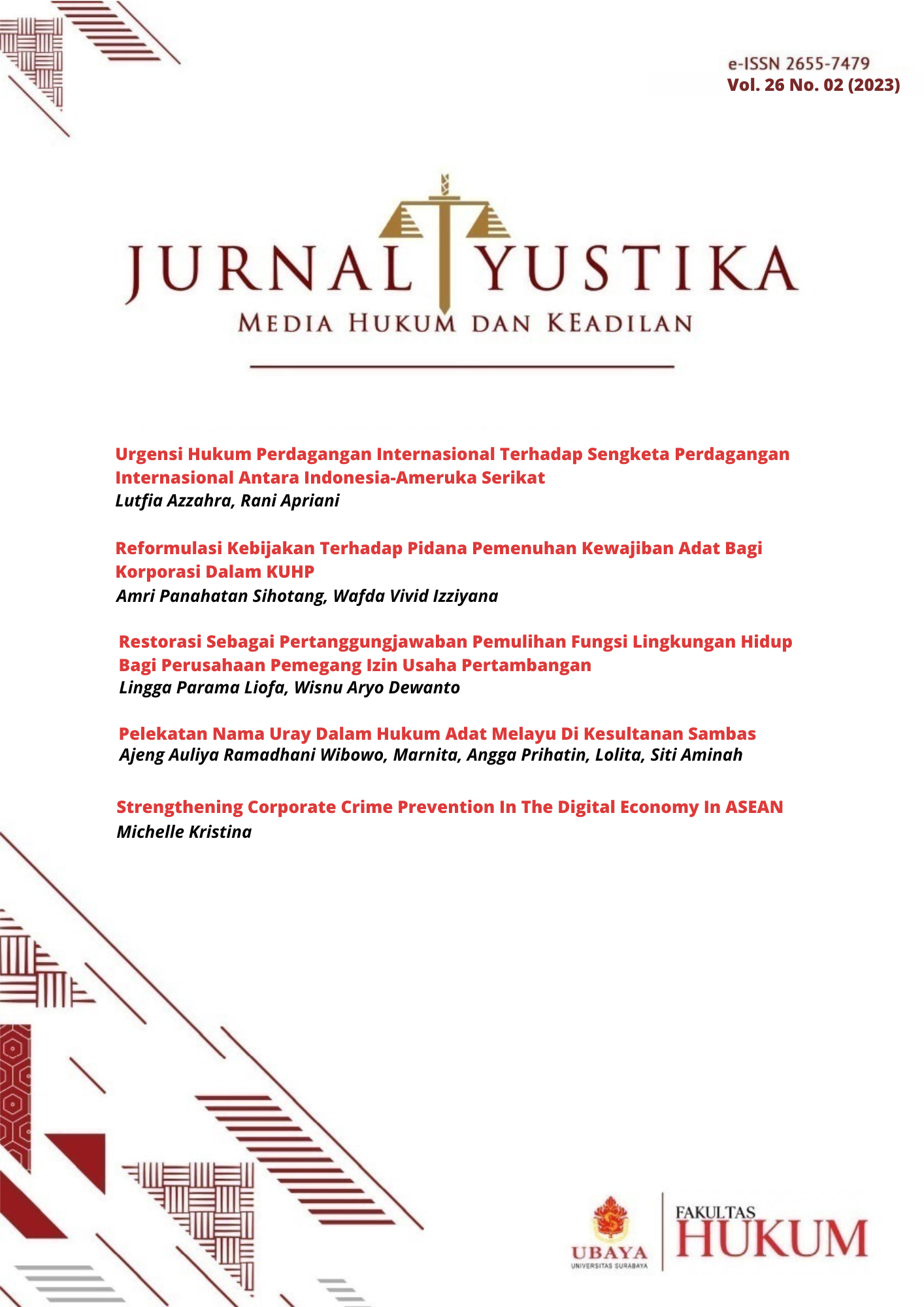Restorasi Sebagai Pertanggungjawaban Pemulihan Fungsi Lingkungan Hidup Bagi Perusahaan Pemegang Izin Usaha Pertambangan
 Abstract Views:
469 times
Abstract Views:
469 times
 PDF Downloads:
458 times
PDF Downloads:
458 times
Abstract
Mining is a business that operates in the exploitation of natural resources, so the potential for natural damage is something that must be faced and addressed wisely. The Law on Environmental Protection and Management has made it mandatory for every person who pollutes the environment to restore environmental functions, one of which is restoration. In summary, restoration is an effort to restore environmental functions in the form of restoring the environment to its original condition. However, the Law on Mineral and Coal Mining stipulates that if the IUP or IUPK holder uses mining services, the responsibility for mining business activities remains borne by the IUP or IUPK holder. This results in a conflict of laws, resulting in a legal vacuum that requires mining service providers to carry out restoration as an action to restore environmental functions. Based on this, this research aims to analyze whether mining service providers whose services are used by mineral and coal mining can be required to carry out restoration as a form of responsibility for restoring environmental functions. The results of this research show that the imposition of mining responsibilities on IUP or IUPK holders also has an impact on the absence of obligations on mining service providers to carry out restoration.
Downloads
References
br Sipayung, Oktaviani. 2023. ‘POLLUTER PAYS PRINCIPLE DALAM PERSPEKTIF HUKUM PIDANA’, 5.4 <https://doi.org/10.31933/unesrev.v5i4>
C.S.T. Kansil. 2008. Modul Hukum Perdata Termasuk Asas Asas Hukum Perdata, Edisi Revisi (Jakarta: PT Pradnya Pramita)
Dan Kewenangan Negara Bidang Pertambangan, Kedudukan DI, Muhammad Hasbi, Jemmy Sondakh, and Donna O Setiabudhi. 2021. ANALISIS YURIDIS PERBEDAAN ANTARA SISTEM KONTRAK KARYA DENGAN SISTEM IZIN USAHA PERTAMBANGAN DITINJAU DARI
Dwi Kurniawan, Kukuh, and Dwi Ratna Indri Hapsari. 2022. ‘Pertanggungjawaban Pidana Korporasi Menurut Vicarious Liability Theory’, Jurnal Hukum Ius Quia Iustum, 29.2 (Universitas Islam Indonesia (Islamic University of Indonesia)): 324–46 <https://doi.org/10.20885/iustum.vol29.iss2.art5>
Gede Atmadja, Dewa. 2018. ‘ASAS-ASAS HUKUM DALAM SISTEM HUKUM’, 12.2: 145–55 <https://doi.org/10.22225/kw.12.2.721.145-155>
Hartiwingsih, and Lushiana Primasari. 2015. ‘TINJAUAN HUKUM PIDANA TERHADAP PERTANGGUNGJAWABAN PIDANA LINGKUNGAN YANG DILAKUKAN OLEH KORPORASI (Studi Putusan Nomor 1405K/PID.SUS/2013)’, Recidive , Volume 4.Pidsna Lingkungan Hidup: 192–200
Hasim, Abdul. 2023. ‘PERLINDUNGAN TERHADAP LINGKUNGAN HIDUP MERUPAKAN BENTUK PENERAPAN GREEN CONSTITUTION DALAM UUD TAHUN 1945’, At-Tanwir Law Review, 3 Nomor 1 tahun 2023.Green Constitution; Lingkungan Hidup; Hak Konstitusional.: 1–17
Marcelino Mandae Patoding. 2021. ‘Pemulihan Lingkungan Hidup Akibat Terjadinyta Perusakan Dan Pencemaran’, Lex Privatum, IX: 56–66
Muhammad Hasb, Jemmy Sondakh, and Donna O. Setiabudhi. 2021. ‘ANALISIS YURIDIS PERBEDAAN ANTARA SISTEM KONTRAK KARYA DENGAN SISTEM IZIN USAHA PERTAMBANGAN DITINJAU DARI’, Lex Privatum : 5–15
Purwendah, Elly Kristiani, and Eti Mul Erowati. 2021. PRINSIP PENCEMAR MEMBAYAR (POLLUTER PAYS PRINCIPLE) DALAM SISTEM HUKUM INDONESIA, Jurnal Pendidikan Kewarganegaraan Undiksha, IX <https://ejournal.undiksha.ac.id/index.php/JJPP>
Siregar, Leonardo. 2020. ‘Penerapan Asas Pencemar Membayar Dalam Perkara Perdata Lingkungan Hidup (Studi Putusan Pengadilan Tinggi Riau Nomor 79/Pdt./2014/PTR) Application of Paying Pollutant Principle in Environmental Civil Cases (Study of Riau High Court Decision Number 79 / Pdt. / 2014 / PTR)’, Jurnal Mercatoria, 13.2 (Online): 2541–5913 <https://doi.org/10.31289/mercatoria.v13i1.3964>
Sugianto, Fajar, Sanggup Leonard Agustian, and Nisa Permata Basti. 2020. ‘EKSISTENSI PRINSIP PENCEMAR MEMBAYAR DALAM SISTEM PENEGAKAN HUKUM AGRARIA’, Tanjungpura Law Journal, 4: 1–21 <http://jurnal.untan.ac.id/index.php/tlj>

This work is licensed under a Creative Commons Attribution-ShareAlike 4.0 International License.
All articles published in YUSTIKA are licensed under a Creative Commons Attribution-ShareAlike 4.0 International (CC BY-SA) license. This means anyone is free to copy, transform, or redistribute articles for any lawful purpose in any medium, provided they give appropriate attribution to the original author(s) and YUSTIKA, link to the license, indicate if changes were made, and redistribute any derivative work under the same license.
Copyright on articles is retained by the respective author(s), without restrictions. A non-exclusive license is granted to YUSTIKA to publish the article and identify itself as its original publisher, along with the commercial right to include the article in a hardcopy issue for sale to libraries and individuals.
Although the conditions of the CC BY-SA license don't apply to authors (as the copyright holder of your article, you have no restrictions on your rights), by submitting to YUSTIKA, authors recognize the rights of readers, and must grant any third party the right to use their article to the extent provided by the license.

 DOI:
DOI:




.jpg)




